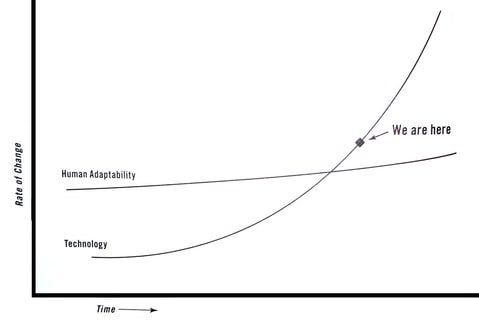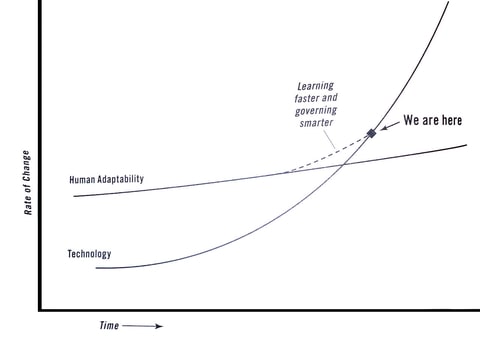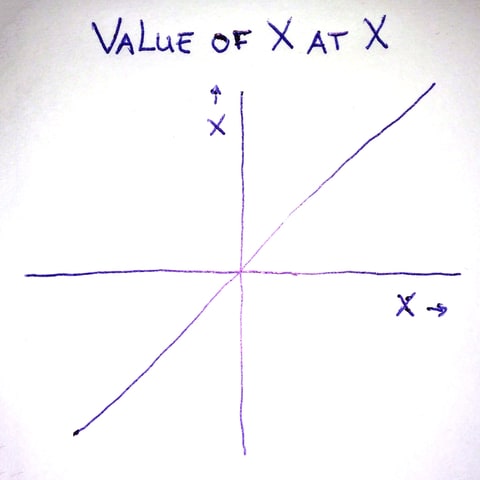The Official Thomas Friedman 'Make a Meaningless Graph' Contest
Friedman graphed history in his new book, 'Thank You For Being Late' – outdo him and win a free T-shirt

"It is okay to change your mind as an opinion writer; what is not okay is to not have a mind," writes Thomas Friedman in his new book, Thank You for Being Late.
He goes on to note that he missed crucial developments in technology in the year 2007 because he was not thinking. By then he'd released three versions of his epic explainer tract, The World Is Flat, and therefore thought he could coast for a while:
RELATED
"The first edition [of The World Is Flat] came out in 2005. I wrote an updated 2.0 edition in 2006 and a 3.0 edition in 2007. And then I stopped, thinking I had built a pretty solid framework that could last me as a columnist for a while.
"I was very wrong! It turned out 2007 was a really bad year to stop thinking!"
It was! And so Friedman's decision to stop thinking in 2007 formed the basis for a chapter in his new book that is, no kidding, entitled, "What the Hell Happened in 2007?"
In that chapter, when we learn that 2007 was the year mankind was introduced to a thing called the "iPhone," Friedman interviews a man named Eric "Astro" Teller. Teller is the CEO of Google's mysterious "X research center," where he's dubbed "Captain of Moonshots" because his job is to dream impossible dreams.
Teller explains to Friedman that technological growth has grown so quickly that it has now outpaced human adaptability. So we are behind the curve, struggling to adjust to a changing world.
Friedman has of course written at least five books on this theme – seven if you want to count the two re-releases of The World Is Flat – but he's never made a visual rendering of it before. In Late, with Teller's help, Friedman graphs the Big Idea:

Hm! "We are here" is stuck at some unknown value higher than where we should be! A few pages later, he graphs the solution to this puzzling dilemma:

See, if the first line represents change, and the second line represents our ability to adapt to change, all we need to do to bring ourselves up to speed is move the first line up a little. Problem solved!
As numerous people on social media have commented, the second graph seems to suggest that the solution to "enhancing humanity's adaptability" involves time travel. But that's nitpicking. These two hilarious diagrams are pure Friedman, and a challenge to fans of the genre. Can you make a more meaningless graph?
The reward for the winner of this Friedman Contest is a "Respect the Stache" T-shirt. They come in a variety of colors, from pink to "safety green" to classic black.
All you have to do to score one is to send your version of a meaningless graph to my Twitter account, @mtaibbi, using the hashtag #friedmangraphs. An example of a solid submission is this "Value of X at X" graph, by @ednl:

Others on social media have plotted variables like "A person's insight" vs. "Extent to which they are a cab driver." There are a great many possibilities.
I'm awarding three T-shirts and will announce the three winners later this week. One shirt is already accounted for through a particularly inspired submission. I'll make an effort to publish as many of the graphs as possible, in the hopes that someone makes a coffee table book out of them.
More on Thank You for Being Late in a day or two. In the meantime, happy drawing, and adapt, humans!








3 opmerkingen:
http://www.foreignpolicyjournal.com/2016/01/06/new-hillary-emails-reveal-true-motive-for-libya-intervention/
http://ronpaulinstitute.org/archives/featured-articles/2016/december/14/bipartisan-war-new-study-urges-more-us-interventions/
Friedmannetje heeft duidelijk de manual of knowledge, logic, nooit gelezen, laat staan de laatste bladzijde, laat staan begrepen, laat staan de implicaties van Gödel's onvolledigheidstheorema. Zo verwonderlijk is dat nu dus ook weer niet, want ditzelfde geldt min of Meer voor prof. Robert Dijkgraaf, "the boss of Princeton", hoewel die Gödel, Escher, Bach: an Eternal Golden Braid, als 1 van zijn favoriete boeken noemt....... :)
Een reactie posten